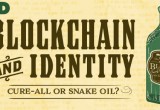Blockchain and biometrics help feed refugees and could rebuild IDs
29 August, 2018
category: Biometrics, Digital ID
A program that uses blockchain and biometrics to feed refugees at relatively low costs has shown promise and could help displaced persons rejoin mainstream society, according to an article in the MIT Technology Review. But as the effort expands, critics are raising questions about the need for such technology and even its ethics.
Refugees could have access to online, encrypted data that help authenticate themselves to authorities and help those immigrants “regain” the legal identities needed for such tasks as getting bank loans, apartments and jobs
The story details how a Syrian refugee buys food from a Jordanian grocery store by submitting to an iris recognition scan at the checkout counter. After confirming his identity via a United Nations database, details of his family’s food account are checked “on a variant of the Ethereum blockchain by the World Food Programme (WFP), and (he) settles his bill without opening his wallet.”
Using blockchain for such transactions saves money because WFP does not have to pay transaction fees to banks to enable those vital purchases, according to sources quoted in the MIT article. The program is called Building Blocks and it launched in early 2017. It now helps the international agency distribute cash-for-food aid to more than 10,000 refugees from the Syrian civil war who now reside in Jordan. By year’s end, Building Blocks will cover all of the 500,000 refugees there. Success could encourage similar efforts at other U.N. and global agencies, the report says.
Using blockchain and biometrics to help refugees regain legal IDs
The program’s potential importance extends well beyond food and cost savings, though. According to the MIT report, “the blockchain-based program … will tackle a central problem in any humanitarian crisis: how do you get people without government identity documents or a bank account into a financial and legal system where those things are prerequisites to getting a job and living a secure life.”
For instance, refugees who move to, say, Western Europe could have access to online, encrypted data that help authenticate themselves to authorities and help those immigrants “regain” the legal identities needed for such tasks as getting bank loans, apartments and jobs.
The Building Blocks program faced at least one stumble in the early going. The MIT reports says that a test in Pakistan resulted in slow transactions and high fees—problems blamed on using a public version of the Ethereum blockchain instead of the private, or “permissioned” type. The ongoing effort in Jordan is using the permissioned blockchain.
Additionally, not everyone is on board with this particular use of blockchain and biometrics. The report quotes observers and analysts who view Building Blocks as an unnecessary “gimmick,” and who question the ethics of testing this technology on vulnerable populations such as refugees. Such critics also wonder if the data collected by this type of program could be exploited by governments bent on oppressing minorities.



